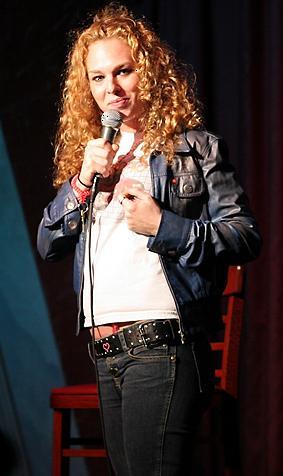
While women use humor to bond, men tend to use it as a way to find out which guy’s the brostest with the mostest. Also, clearly, women prefer wordplay. As I watched comedienne Laura Levites’ one-woman show, which she aptly named How Did I Get Here?, I found myself pondering that same thought in a more philosophical way (watch out! I’m about to get deep).
How did we get here?
How do we get there?
And, really, what brings people into comedy in the first place?
Levites’ show, as the performer told me later, was one of her very first. That much was apparent, I found, as she occasionally showed small signs of self-doubt; but even with those signs, her message was a clear and genuine, “How did I get here?”
The comedienne shared stories of relationships gone wildly amiss: an abusive boyfriend who attempted suicide for her; another who was a regular on AdultFriendFinder.com (an OKCupid for young and old — together); and another who wasn’t supposed to be relationship-material at all, but a pregnancy scare, after she took a vow to only date and send long-term relationships to hell, brought them together for a short, tense period of time; and the list goes on.
And after each anecdote, Levites looked out at the audience and repeated the central question of the performance.
None of that sounds like the usual source of comedy — in fact, the audience was stunned silent for a lot of it, trying to soak everything in — but still, I thought, she’s here.
I wonder if one of the reasons “female comedy” is, first of all, separated, and secondly, understated, is because of its very nature: we use it to bond. Is that why men find it so hard to get out of the “chick comedy is for chicks only” mentality? That we put a lot of focus on storytelling and forging connections instead of jumping to a punchline?
Levites had a number of jobs and a number of shocking experiences in her life before she took her very first steps into the world of comedy, and the more power to her. What I liked most about her show was just how unguarded it was: the comedienne never claims to have been innocent; in fact, she makes a point of exposing her own flaws and wraps the whole thing up by saying, “I regret nothing — I’m here.”
It’s a bold statement, to be sure, and at a time when it seems women in comedy are on the rise, it’s an important one.
With movies like Baby Mama and Bridesmaids shocking everyone with their successes — especially with their very women-centric titles and themes — it seems that the great gender chasm in the comedy world is finally shrinking, and work that speaks to the female experience is bringing women up and at ’em.
So what I got out of going to Levites’s show was that, first of all, there’s hope. She’s a prime example of the growing influence of women in comedy, as she takes some of the worst experiences anyone can possibly have and finds the humor in them and fearlessly tells them as stories with meaningful subtext.
And, ultimately, what all this means is that there are so many different ways anyone of any gender can break into comedy; the criteria is changing, and audiences can find work that satisfies their own particular needs.
****
